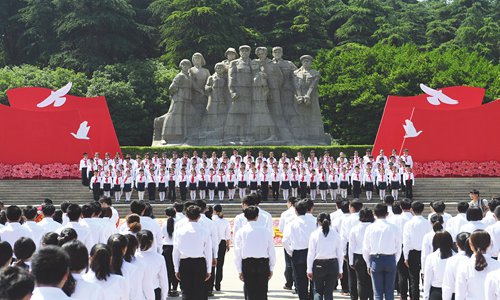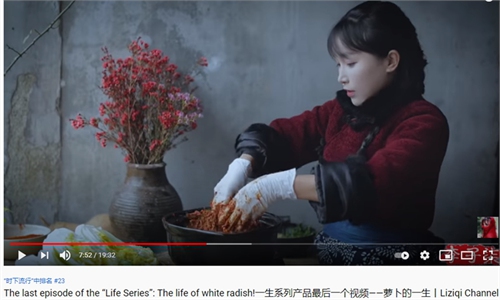IN-DEPTH / IN-DEPTH
Chinese netizens unimpressed with S.Korean scholar’s claim about May Fourth Movement

Hundreds of students commemorate the 99th anniversary of the May Fourth Movement at Yuhuatai Memorial Park of Revolutionary Martyrs, in Nanjing, capital of East China's Jiangsu Province on Friday. The students are members of the Communist Youth League of China and the Young Pioneers of China. The May Fourth Movement was an anti-imperialist, cultural, and political movement growing out of student participants in Beijing on May 4, 1919. Photos: VCG
A South Korean "old China hand" scholar said on a variety show that China's May Fourth Movement was inspired by the March First Movement in Korea, causing a storm of anger among Chinese netizens.Do-ol Ah-in Go In All Directions, a South Korean culture talk show, recently ran a special program about the March First Movement, a mass national liberation movement against Japanese colonial rule that broke out on the Korean Peninsula on March 1, 1919.
When describing the influence of the movement on the world, guest speaker Kim Yong-ok said that Chinese people at that time lacked national consciousness and a sense of independent struggle, and it was the Korean people's courage to resist Japanese aggression that made Chinese students reflect on it and then begin the May Fourth Movement.
Kim Yong-wo is a South Korean scholar who has reinterpreted ancient Chinese classics such as the Analects of Confucius and the Tao Te Ching from a modern perspective for mainstream Korean TV, which have been widely welcomed by the local people.
However, Kim's observation provoked an outcry among Chinese netizens on China's Twitter-like Sina Weibo, who said he was falsifying history.
Although it took place in the same year, China's May Fourth Movement was an anti-imperialist and anti-feudal patriotic movement launched by Chinese students and workers on May 4 with a clear fuse.
According to historical records, the May Fourth Movement was triggered by the diplomatic failure of the then Chinese delegation at the Paris Peace Conference, where the victorious Western nations in World War I ceded German control of China's Shandong Province to Japan. It also gave rise to the New Culture Movement in China marked by criticizing traditional Chinese ideas and promoting a new Chinese culture.
Chinese historians believe that the May Fourth Movement and the March First Movement supported each other and advanced side by side.
It is not the first time South Korea's entertainment industry has caused controversy in China with comments about political or cultural issues.
At the same time, Chinese and South Korean netizens have been locked in debate in recent months after Chinese food vlogger Li Ziqi released a video on YouTube of herself making Kimchi.
"There are differences between Chinese and South Koreans in interpreting their own history and culture, and amid the usual media hype a small number of extreme opinions can be widely spread, causing communication between the two countries to be more emotional or even irrational," Dong Xiangrong, a professor at the National Institute of International Strategy under the Chinese Academy of Social Sciences (CASS), told the Global Times on Thursday.
Dong noted that such spats are related to the ideological differences and intensified economic competition between the two countries, as well as the fact that some South Koreans lack a basic historical knowledge about the exchanges between China and South Korea over the centuries.
Dong said such imbroglios among Chinese and South Korean people are "meaningless and unnecessary."
"We should not deny the mainstream of China-ROK relations just because of some individual noises," Dong said, calling for people to view each other's culture with an open mind, dilute differences and seeing common ground.


